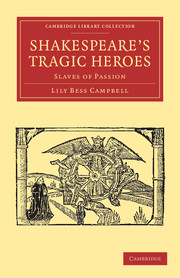CHAPTER TWELVE
Hamlet: A Tragedy of Grief.
Published online by Cambridge University Press: 07 September 2010
Summary
Hamlet has suffered from an exegesis so minute and so diffuse and varied that essential facts have become commonplaces of criticism without their full significance ever being recognized. And indeed it is almost as hard to read Hamlet freshly as to read the Sermon on the Mount as though it were a document and not a collection of texts for sermons. Yet I believe that if Hamlet is read against a background of contemporary philosophy, it will come to life as a study in passion, rather obviously constructed to show the profound truth of its dominant idea:
What to ourselves in passion we propose,
The passion ending, doth the purpose lose,
The violence of either grief or joy
Their own enactures with themselves destroy.
Where joy most revels, grief doth most lament;
Grief joys, joy grieves, on slender accident.
But the method which Shakespeare has pursued in his study of passion is here the same as in his other tragedies, a method described in the words of Betterton quoted earlier; persons of different temperaments are shown under the influence of the same passion, so that we may see the passion variously manifested. And as everyone is fully aware, the play of Hamlet is concerned with the story of three young men—Hamlet, Fortinbras, and Laertes—each called upon to mourn the death of a father, each feeling himself summoned to revenge wrongs suffered by his father.
- Type
- Chapter
- Information
- Shakespeare's Tragic HeroesSlaves of Passion, pp. 109 - 147Publisher: Cambridge University PressPrint publication year: 2009First published in: 1930



